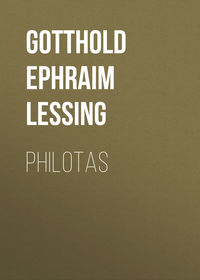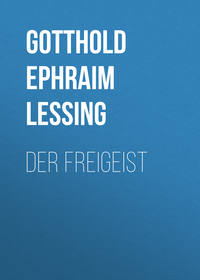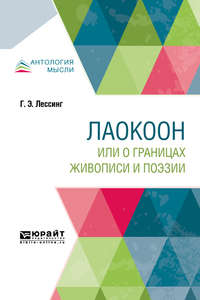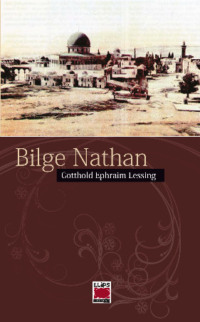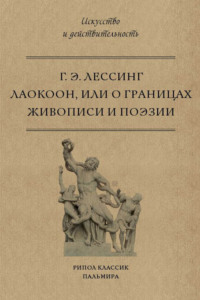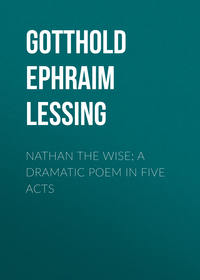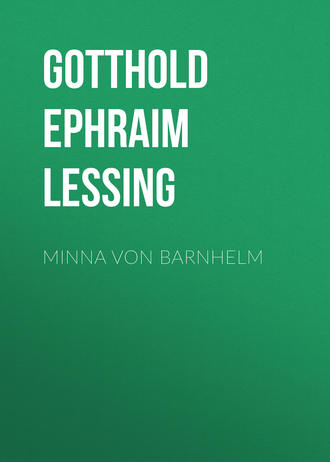 полная версия
полная версияMinna Von Barnhelm
JUST.
Have no fear, Major!
MAJ. T. (comes back).
Above all things, do not let my pistols be forgotten, which hang beside the bed.
JUST.
I will forget nothing.
MAJ. T. (comes back again).
Another thing: bring your dog with you too. Do you hear, Just?
SCENE XI
Just
JUST.
The dog will not stay behind, he will take care of that. Hem! My master still had this valuable ring and carried it in his pocket instead of on his finger! My good landlord, we are not yet so poor as we look. To him himself, I will pawn you, you beautiful little ring! I know he will be annoyed that you will not all be consumed in his house. Ah!
SCENE XII
Paul Werner, Just
JUST.
Hullo, Werner! good-day to you, Werner. Welcome to the town.
WER.
The accursed village! I can't manage to get at home in it again.
Merry, my boys, merry; I have got some more money! Where is the Major?
JUST.
He must have met you; he just went down stairs.
WER.
I came up the back stairs. How is he? I should have been with you last week, but!!!!!
JUST.
Well, what prevented you?
WER.
Just, did you ever hear of Prince Heraclius?
JUST.
Heraclius? Not that I know of.
WER.
Don't you know the great hero of the East?
JUST.
I know the wise men of the East well enough, who go about with the stars on New Year's Eve.
WER.
Brother, I believe you read the newspapers as little as the Bible. You do not know Prince Heraclius. Not know the brave man who seized Persia, and will break into the Ottoman Porte in a few days? Thank God, there is still war somewhere in the world! I have long enough hoped it would break out here again. But there they sit and take care of their skins. No, a soldier I was, and a soldier I must be again! In short, (looking round carefully, to see if anyone is listening) between ourselves, Just, I am going to Persia, to have a few campaigns against the Turks, under his Royal Highness Prince Heraclius.
JUST.
You?
WER.
I myself. Our ancestors fought bravely against the Turks; and so ought we too, if we would be honest men and good Christians. I allow that a campaign against the Turks cannot be half so pleasant as one against the French; but then it must be so much the more beneficial in this world and the next. The swords of the Turks are all set with diamonds.
JUST.
I would not walk a mile to have my head split with one of their sabres. You will not be so mad as to leave your comfortable little farm!
WER.
Oh! I take that with me. Do you see? The property is sold.
JUST.
Sold?
WER.
Hist! Here are a hundred ducats, which I received yesterday towards the payment: I am bringing them for the Major.
JUST.
What is he to do with them?
WER.
What is he to do with them? Spend them; play them, or drink them away, or whatever he pleases. He must have money, and it is bad enough that they have made his own so troublesome to him. But I know what I would do, were I in his place. I would say—"The deuce take you all here; I will go with Paul Werner to Persia!" Hang it! Prince Heraclius must have heard of Major von Tellheim, if he has not heard of Paul Werner, his late sergeant. Our affair at Katzenhauser!!!!!
JUST.
Shall I give you an account of that?
WER.
You give me! I know well that a fine battle array is beyond your comprehension. I am not going to throw my pearls before swine. Here, take the hundred ducats; give them to the Major: tell him, he may keep these for me too. I am going to the market now. I have sent in a couple of loads of rye; what I get for them he can also have.
JUST.
Werner, you mean it well; but we don't want your money. Keep your ducats; and your hundred pistoles you can also have back safe, as soon as you please.
WER.
What, has the Major money still?
JUST.
No.
WER.
Has he borrowed any?
JUST.
No.
WER.
On what does he live, then?
JUST.
We have everything put down in the bill; and when they won't put anything more down, and turn us out of the house, we pledge anything we may happen to have, and go somewhere else. I say, Paul, we must play this landlord here a trick.
WER.
If he has annoyed the Major, I am ready.
JUST.
What if we watch for him in the evening, when he comes from his club, and give him a good thrashing?
WER.
In the dark! Watch for him! Two to one! No, that won't do.
JUST.
Or if we burn his house over his head?
WER.
Fire and burn! Why, Just, one hears that you have been baggage-boy and not soldier. Shame!
JUST.
Or if we ruin his daughter? But she is cursedly ugly.
WER.
She has probably been ruined long ago. At any rate you don't want any help there. But what is the matter with you? What has happened?
JUST.
Just come with me, and you shall hear something to make you stare.
WER.
The devil must be loose here, then?
JUST.
Just so; come along.
WER.
So much the better! To Persia, then; to Persia.
ACT II
SCENE I
Minna's Room. Minna, Franziska
MIN. (in morning dress, looking at her watch).
Franziska, we have risen very early. The time will hang heavy on our hands.
FRAN.
Who can sleep in these abominable large towns? The carriages, the watchmen, the drums, the cats, the soldiers, never cease to rattle, to call, to roll, to mew, and to swear; just as if the last thing the night is intended for was for sleep. Have a cup of tea, my lady!
MIN.
I don't care for tea.
FRAN.
I will have some chocolate made.
MIN.
For yourself, if you like.
FRAN.
For myself! I would as soon talk to myself as drink by myself. Then the time will indeed hang heavy. For very weariness we shall have to make our toilets, and try on the dress in which we intend to make the first attack!
MIN.
Why do you talk of attacks, when I have only come to require that the capitulation be ratified?
FRAN.
But the officer whom we have dislodged, and to whom we have apologized, cannot be the best bred man in the world, or he might at least have begged the honour of being allowed to wait upon you.
MIN.
All officers are not Tellheims. To tell you the truth, I only sent him the message in order to have an opportunity of inquiring from him about Tellheim. Franziska, my heart tells me my journey will be a successful one and that I shall find him.
FRAN.
The heart, my lady! One must not trust to that too much. The heart echoes to us the words of our tongues. If the tongue was as much inclined to speak the thoughts of the heart, the fashion of keeping mouths under lock and key would have come in long ago.
MIN.
Ha! ha! mouths under lock and key. That fashion would just suit me.
FRAN.
Rather not show the most beautiful set of teeth, than let the heart be seen through them every moment.
MIN.
What, are you so reserved?
FRAN.
No, my lady; but I would willingly be more so. People seldom talk of the virtue they possess, and all the more often of that which they do not possess.
MIN.
Franziska, you made a very just remark there.
FRAN.
Made! Does one make it, if it occurs to one?
MIN.
And do you know why I consider it so good? It applies to my Tellheim.
FRAN.
What would not, in your opinion, apply to him?
MIN.
Friend and foe say he is the bravest man in the world. But who ever heard him talk of bravery? He has the most upright mind; but uprightness and nobleness of mind are words never on his tongue.
FRAN.
Of what virtues does he talk then?
MIN.
He talks of none, for he is wanting in none.
FRAN.
That is just what I wished to hear.
MIN.
Wait, Franziska; I am wrong. He often talks of economy. Between ourselves, I believe he is extravagant.
FRAN.
One thing more, my lady. I have often heard him mention truth and constancy toward you. What, if he be inconstant?
MIN.
Miserable girl! But do you mean that seriously?
FRAN.
How long is it since he wrote to you?
MIN.
Alas! he has only written to me once since the peace.
FRAN.
What!—A sigh on account of the peace? Surprising? Peace ought only to make good the ill which war causes; but it seems to disturb the good which the latter, its opposite, may have occasioned. Peace should not be so capricious!… How long have we had peace? The time seems wonderfully long, when there is so little news. It is no use the post going regularly again; nobody writes, for nobody has anything to write about.
MIN.
"Peace has been made," he wrote to me, "and I am approaching the fulfillment of my wishes." But since he only wrote that to me once, only once!!!!!
FRAN.
And since he compels us to run after this fulfillment of his wishes ourselves… If we can but find him, he shall pay for this! Suppose, in the meantime, he may have accomplished his wishes, and we should learn here that!!!!!
MIN. (anxiously).
That he is dead?
FRAN.
To you, my lady; and married to another.
MIN.
You tease, you! Wait, Franziska, I will pay you out for this! But talk to me, or I shall fall asleep. His regiment was disbanded after the peace. Who knows into what a confusion of bills and papers he may thereby have been brought? Who knows into what other regiment, or to what distant station, he may have been sent? Who knows what circumstances—There's a knock at the door.
FRAN.
Come in!
SCENE II
Landlord, Minna, Franziska
LAND. (putting his head in at the door).
Am I permitted, your ladyship?
FRAN.
Our landlord?—Come in!
LAND. (A pen behind his ear, a sheet of paper and an inkstand in his hand).
I am come, your ladyship, to wish you a most humble good-morning;
(to Franziska) and the same to you, my pretty maid.
FRAN.
A polite man!
MIN.
We are obliged to you.
FRAN.
And wish you also a good-morning.
LAND.
May I venture to ask how your ladyship has passed the first night under my poor roof?
FRAN.
The roof is not so bad, sir; but the beds might have been better.
LAND.
What do I hear! Not slept well! Perhaps the over-fatigue of the journey!!!!!
MIN.
Perhaps.
LAND.
Certainly, certainly, for otherwise.... Yet, should there be anything not perfectly comfortable, my lady, I hope you will not fail to command me.
FRAN.
Very well, Mr. Landlord, very well! We are not bashful; and least of all should one be bashful at an inn. We shall not fail to say what we may wish.
LAND.
I next come to…
(taking the pen from behind his ear).
FRAN.
Well?
LAND.
Without doubt, my lady, you are already acquainted with the wise regulations of our police.
MIN.
Not in the least, sir.
LAND.
We landlords are instructed not to take in any stranger, of whatever rank or sex he may be, for four-and-twenty hours, without delivering, in writing, his name, place of abode, occupation, object of his journey, probable stay, and so on, to the proper authorities.
MIN.
Very well.
LAND.
Will your ladyship then be so good…
(going to the table, and making ready to write).
MIN.
Willingly. My name is!!!!!
LAND.
One minute!
(He writes.)
"Date, 22nd August, A. D., &C.; arrived at the King of Spain hotel."
Now your name, my lady.
MIN.
Fraulein von Barnhelm.
LAND. (writes).
"Von Barnhelm." Coming from.... where, your ladyship?
MIN.
From my estate in Saxony.
LAND. (writes).
"Estate in Saxony." Saxony! Indeed, indeed! In Saxony, your ladyship?
Saxony?
FRAN.
Well, why not? I hope it is no sin in this country to come from Saxony!
LAND.
A sin? Heaven forbid! That would be quite a new sin! From Saxony then?
Yes, yes, from Saxony, a delightful country, Saxony! But if I am right, your ladyship, Saxony is not small, and has several—how shall I call them? districts, provinces. Our police are very particular, your ladyship.
MIN.
I understand. From my estate in Thuringia, then.
LAND.
From Thuringia! Yes, that is better, your ladyship; that is more exact.
(Writes and reads.)
"Fraulein von Barnhelm, coming from her estate in Thuringia, together with her lady in waiting and two men servants."
FRAN.
Lady in waiting! That means me, I suppose!
LAND.
Yes, my pretty maid.
FRAN.
Well, Mr. Landlord, instead of "lady in waiting," write "maid in waiting." You say, the police are very exact; it might cause a misunderstanding, which might give me trouble some day when my banns are read out. For I really am still unmarried, and my name is Franziska, with the family name of Willig: Franziska Willig. I also come from Thuringia. My father was a miller, on one of my lady's estates. It is called Little Rammsdorf. My brother has the mill now. I was taken very early to the manor, and educated with my lady. We are of the same age—one-and-twenty next Candlemas. I learnt everything my lady learnt. I should like the police to have a full account of me.
LAND.
Quite right, my pretty maid; I will bear that in mind, in case of future inquiries. But now, your ladyship, your business here?
MIN.
My business here?
LAND.
Have you any business with His Majesty the King?
MIN.
Oh! no.
LAND.
Or at our courts of justice?
MIN.
No.
LAND.
Or!!!!!
MIN.
No, no. I have come here solely on account of my own private affairs.
LAND.
Quite right, your ladyship; but what are those private affairs?
MIN.
They are… Franziska, I think we are undergoing an examination.
FRAN.
Mr. Landlord, the police surely do not ask to know a young lady's secrets!
LAND.
Certainly, my pretty maid; the police wish to know everything, and especially secrets.
FRAN.
What is to be done, my lady?… Well, listen, Mr. Landlord—but take care that it does not go beyond ourselves and the police.
MIN.
What is the simpleton going to tell him?
FRAN.
We come to carry off an officer from the king.
LAND.
How? What? My dear girl!
FRAN.
Or to let ourselves be carried off by the officer. It is all one.
MIN.
Franziska, are you mad? The saucy girl is laughing at you.
LAND.
I hope not! With your humble servant indeed she may jest as much as she pleases; but with the police!!!!!
MIN.
I tell you what; I do not understand how to act in this matter.
Suppose you postpone the whole affair till my uncle's arrival. I told you yesterday why he did not come with me. He had an accident with his carriage ten miles from here, and did not wish that I should remain a night longer on the road, so I had to come on. I am sure he will not be more than four-and-twenty hours after us.
LAND.
Very well, madam, we will wait for him.
MIN.
He will be able to answer your questions better. He will know to whom, and to what extent, he must give an account of himself—what he must relate respecting his affairs, and what he may withhold.
LAND.
So much the better! Indeed one cannot expect a young girl (looking at Franziska in a marked manner) to treat a serious matter with serious people in a serious manner.
MIN.
And his rooms are in readiness, I hope?
LAND.
Quite, your ladyship, quite; except the one!!!!!
FRAN.
Out of which, I suppose, you will have to turn some other honourable gentleman!
LAND.
The waiting maids of Saxony, your ladyship, seem to be very compassionate.
MIN.
In truth, sir, that was not well done. You ought rather to have refused us.
LAND.
Why so, your ladyship, why so?
MIN.
I understand that the officer who was driven out on our account!!!!!
LAND.
Is only a discharged officer, your ladyship.
MIN.
Well, what then?
LAND.
Who is almost done for.
MIN.
So much the worse! He is said to be a very deserving man.
LAND.
But I tell you he is discharged.
MIN.
The king cannot be acquainted with every deserving man.
LAND.
Oh! doubtless he knows them; he knows them all.
MIN.
But he cannot reward them all.
LAND.
They would have been rewarded if they had lived so as to deserve it.
But they lived during the war as if it would last for ever; as if the words "yours" and "mine" were done away with altogether. Now all the hotels and inns are full of them, and a landlord has to be on his guard with them. I have come off pretty well with this one. If he had no more money, he had at any rate money's worth; and I might indeed have let him remain quiet two or three months longer. However, it is better as it is. By-the-by, your ladyship, you understand about jewels, I suppose?
MIN.
Not particularly.
LAND.
Of course your ladyship must. I must show you a ring, a valuable ring.
I see you have a very beautiful one on your finger; and the more I look at it, the more I am astonished at the resemblance it bears to mine. There! just look, just look!
(Taking the ring from its case, and handing it to her.)
What brilliancy! The diamond in the middle alone weighs more than five carats.
MIN. (looking at it).
Good heavens! What do I see? This ring!!!!!
LAND.
Is honestly worth fifteen hundred thalers.
MIN.
Franziska! look!
LAND.
I did not hesitate for a moment to advance eighty pistoles on it.
MIN.
Do not you recognize it, Franziska?
FRAN.
The same! Where did you get that ring, Mr. Landlord?
LAND.
Come, my girl! you surely have no claim to it?
FRAN.
We have no claim to this ring! My mistress' monogram must be on it, on the inner side of the setting. Look at it, my lady.
MIN.
It is! it is! How did you get this ring?
LAND.
I! In the most honourable way in the world. You do not wish to bring me into disgrace and trouble, your ladyship! How do I know where the ring properly belongs? During the war many a thing often changed masters, both with and without the knowledge of its owner. War was war. Other rings will have crossed the borders of Saxony. Give it me again, your ladyship; give it me again!
FRAN.
When you have said from whom you got it.
LAND.
From a man whom I cannot think capable of such things; in other respects a good man.
MIN.
From the best man under the sun, if you have it from its owner. Bring him here directly! It is himself, or at any rate he must know him.
LAND.
Who? who, your ladyship?
FRAN.
Are you deaf? Our Major!
LAND.
Major! Right! he is a Major, who had this room before you, and from whom I received it.
MIN.
Major von Tellheim!
LAND.
Yes, Tellheim. Do you know him?
MIN.
Do I know him! He is here! Tellheim here! He had this room! He! he pledged this ring with you! What has brought him into this embarrassment? Where is he? Does he owe you anything? Franziska, my desk here! Open it!
(Franziska puts it on the table and opens it.)
What does he owe you? To whom else does he owe anything? Bring me all his creditors! Here is gold: here are notes. It is all his!
LAND.
What is this?
MIN.
Where is he? Where is he?
LAND.
An hour ago he was here.
MIN.
Detested man! how could you act so rudely, so hardly, so cruelly towards him?
LAND.
Your ladyship must pardon!!!!!
MIN.
Quick! Bring him to me.
LAND.
His servant is perhaps still here. Does your ladyship wish that he should look for him?
MIN.
Do I wish it? Begone, run. For this service alone I will forget how badly you have behaved to him.
FRAN.
Now then, quick, Mr. Landlord! Be off! fly! fly!
(Pushes him out.)
SCENE III
Minna, Franziska
MIN.
Now I have found him again, Franziska! Do you hear? Now I have found him again! I scarcely know where I am for joy! Rejoice with me, Franziska. But why should you? And yet you shall; you must rejoice with me. Come, I will make you a present, that you may be able to rejoice with me. Say, Franziska, what shall I give you? Which of my things would please you? What would you like? Take what you will; only rejoice with me. I see you will take nothing. Stop!
(Thrusts her hand into the desk.)
There, Franziska, (gives her money) buy yourself what you like. Ask for more, if it be not sufficient; but rejoice with me you must. It is so melancholy to be happy alone.
There, take it, then.
FRAN.
It is stealing it from you, my lady. You are intoxicated, quite intoxicated with joy.
MIN.
Girl, my intoxication is of a quarrelsome kind. Take it, or (forcing money into her hand)
… and if you thank me… Stay, it is well that I think of it.
(Takes more money from the desk.)
Put that aside, Franziska, for the first poor wounded soldier who accosts us.
SCENE IV
Landlord, Minna, and Franziska
MIN.
Well, is he coming?
LAND.
The cross, unmannered fellow!
MIN.
Who?
LAND.
His servant. He refuses to go for him.
FRAN.
Bring the rascal here, then. I know all the Major's servants. Which one of them was it?
MIN.
Bring him here directly. When he sees us he will go fast enough.
(Exit Landlord.)
SCENE V
Minna, Franziska
MIN.
I cannot bear this delay. But, Franziska, how cold you are still! Why will you not share my joy with me?
FRAN.
I would from my heart, if only!!!!!
MIN.
If only what?
FRAN.
We have found him again. But how have we found him? From all we hear, it must go badly with him. He must be unfortunate. That distresses me.
MIN.
Distresses you! Let me embrace you for that, my dear playmate! I shall never forget this of you. I am only in love, you are good.
SCENE VI
Landlord, Just, Minna, Franziska
LAND.
With great difficulty I have brought him.
FRAN.
A strange face! I do not know him.
MIN.
Friend, do you live with Major von Tellheim?
JUST.
Yes.
MIN.
Where is your master?
JUST.
Not here.
MIN.
But you could find him?
JUST.
Yes.
MIN.
Will you fetch him quickly?
JUST.
No.
MIN.
You will be doing me a favour.
JUST.
Indeed!
MIN.
And your master a service.
JUST.
Perhaps not.
MIN.
Why do you suppose that?
JUST.
You are the strange lady who sent your compliments to him this morning, I think?
MIN.
Yes.
JUST.
Then I am right.
MIN.
Does your master know my name?
JUST.
No; but he likes over-civil ladies as little as over-uncivil landlords.
LAND.
That is meant for me, I suppose?
JUST.
Yes.
LAND.
Well, do not let the lady suffer for it then; but bring him here directly.
MIN. (to Franziska).
Franziska, give him something
FRAN. (trying to put some money into Just's hand).
We do not require your services for nothing.
JUST.
Nor I your money without services.
FRAN.
One in return for the other.
JUST.
I cannot. My master has ordered me to pack up. That I am now about, and I beg you not to hinder me further. When I have finished, I will take care to tell him that he may come here. He is close by, at the coffee-house; and if he finds nothing better to do there, I suppose he will come.
(Going.)
FRAN.
Wait a moment! My lady is the Major's… sister.
MIN.
Yes, yes, his sister.
JUST.
I know better; the Major has not a sister. He has sent me twice in six months to his family in Courland. It is true there are different sorts of sisters!!!!!




